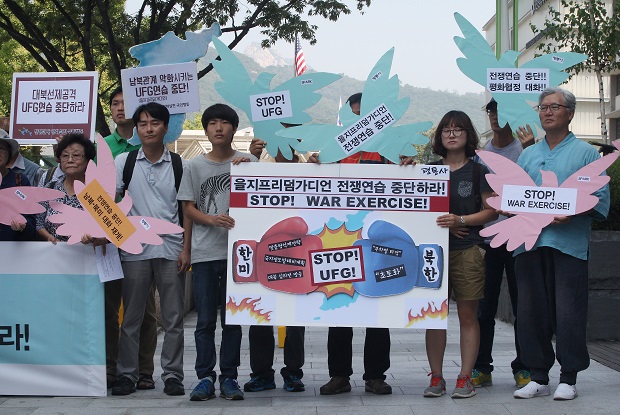Seoul: North Korea resumes loudspeaker broadcasts amid tension

South Korean protesters stage a rally demanding to stop the joint military exercises, Ulchi Freedom Guardian or UFG, between the US and South Korea near the US Embassy in Seoul, South Korea, Monday, Aug. 17, 2015. The UFG exercise kicked off Monday for a 12-day run to prepare for a possible North Korea’s attack. A banner, center, reads ” Stop Ulchi Freedom Guardian exercise.” (Photo by Ahn Young-joon/AP)
SEOUL, South Korea — The rival Koreas have resumed cross-border propaganda warfare as North Korea matched South Korea’s loudspeaker campaign with broadcasts of its own that reportedly included criticism of Seoul and praises for Pyongyang.
The mutual propaganda attacks mark a further deterioration of relations between the Koreas, who haven’t engaged in any serious talks in recent months.
Last week, South Korea blamed the North for land mine explosions that maimed two South Korean soldiers and resumed propaganda broadcasts for the first time in 11 years in retaliation. North Korea has denied the accusations and threatened to launch strikes on South Korean loudspeakers.
READ: North Korea threatens strikes over South propaganda broadcasts
Two to three days after South Korea’s restart of broadcasts, North Korea began its own loudspeaker campaign along the border, a South Korean Defense Ministry official said Tuesday speaking on condition of anonymity because of department rules.
Article continues after this advertisementThe official gave no further details and South Korea’s military said in a statement that the North Korean broadcasts were not clearly audible in South Korean areas. But South Korean public broadcaster KBS, citing an unidentified military official, reported that the North Korean broadcasts mainly included criticism of South Korea and praises for North Korea’s political system.
Article continues after this advertisementThe North’s broadcasts mark the restoration of inter-Korean propaganda warfare along the border after the two Koreas stopped the practice in 2004 as part of their efforts to ease animosities. Other practices, including leafleting and the operation of front-line billboards, remain suspended, according to Seoul officials.
Animosities between the rivals are expected to continue as Seoul and Washington kicked off annual military drills that Pyongyang calls an invasion rehearsal. South Korean and US officials have said that the drills are defensive in nature.
US State Department spokesman John Kirby said the “routine” exercises were proceeding normally. “We look forward to completing the exercises, as we always do. This is all about proving alliance capability,” he told reporters in Washington.
READ: Korea, US begin military drill despite N. Korea threats
South Korea has said the two soldiers wounded from the mine explosion were on a routine patrol at the southern part of the Demilitarized Zone that separates the two Koreas. One soldier lost both legs, while the other lost one leg.
South Korean loudspeaker broadcasts were aimed at emphasizing that the mine blast was a provocation committed by North Korea and relaying messages about the superiority of Seoul-style democracy as well as world news and weather forecasts, the South Korean Defense Ministry official said.
North Korea is intolerant of any outside criticism of its leadership, led by Kim Jong Un. Last year, North Korean troops opened fire after South Korean activists floated balloons carrying propaganda leaflets across the border. South Korea returned fire, but no casualties were reported.
The Koreas’ mine-strewn DMZ is the world’s most heavily armed border, with hundreds of thousands of combat troops facing each other. It’s a legacy of the 1950-53 Korean War, which ended with an armistice, not a peace treaty.